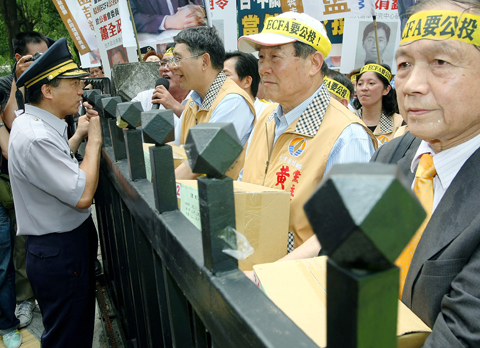The Taiwan Solidarity Union (TSU) is showing no sign of giving up its fight to turn the recently signed cross-strait trade agreement over to a public referendum.
Delivering nearly 100 boxes, each holding more than 1,000 signed petition forms, to the Central Election Commission (CEC) yesterday, TSU officials said the Economic Cooperation Framework Agreement (ECFA) could alter the status quo for Taiwan and lock the country into a “one China” framework.
“Everyone can clearly see that this ECFA will change Taiwan’s economic, social and political relationship with China,” TSU Chairman Huang Kun-huei (黃昆輝) said outside the CEC in Taipei. “President Ma Ying-jeou (馬英九) is unilaterally changing the cross-strait situation, and we want to ask him: Doesn’t this require the people’s approval?”

PHOTO: CNA
This is the second referendum proposal on the controversial agreement raised by the TSU, which wants to ask voters whether they agree with the government’s decision to sign the ECFA with China. The earlier proposal was rejected by the Referendum Review Commission last month after it said the TSU’s referendum question and content contradicted one another.
Flanked by a number of pro-independence organizations, including the Taiwan Association of University Professors and the World United Formosans for Independence, a dozen TSU officials arrived outside the commission, wheeling dozens of brown boxes containing the petition forms.
An apparent misunderstanding initially took place between the TSU officials and police after police officers first closed the outside gates, barring entry to party officials trying to hand their petition forms over to the CEC.
Amid cries from dozens of protesters at the scene, who yelled that a referendum “is a public right,” and “the ECFA needs a referendum,” police opened the outside gate to a small number of TSU officials including Huang, but subsequently tried to close the glass doors to the building.
All of the TSU’s 105,000 petition forms were eventually delivered after CEC officials came out to officially accept the TSU proposal, which prevented tension from boiling over as more than 20 police officers looked on.
Under the Referendum Act (公民投票法), the CEC has 15 days to either accept the proposal and pass it on to the Referendum Review Committee or send it back to the organizers pending corrections of any errors found.
The referendum review committee must then make a decision on whether to give the go-ahead within one month.
If passed, the TSU will have to gather a total of 860,000 petition forms — 5 percent of the voting public in the last presidential election — before the proposal can be put to the ballot box.
Fearing a repeat of last month’s rejection of the more than 110,000 petitions submitted at the time, Huang called on members of the Referendum Review Committee to avoid politicizing the referendum process.
“The committee and the CEC are responsible for aiding the people’s right to a referendum, not blocking it. Committee members should not see the public as the enemy,” Huang said.

Taiwan is stepping up plans to create self-sufficient supply chains for combat drones and increase foreign orders from the US to counter China’s numerical superiority, a defense official said on Saturday. Commenting on condition of anonymity, the official said the nation’s armed forces are in agreement with US Admiral Samuel Paparo’s assessment that Taiwan’s military must be prepared to turn the nation’s waters into a “hellscape” for the Chinese People’s Liberation Army (PLA). Paparo, the commander of the US Indo-Pacific Command, reiterated the concept during a Congressional hearing in Washington on Wednesday. He first coined the term in a security conference last

A magnitude 4.3 earthquake struck eastern Taiwan's Hualien County at 8:31am today, according to the Central Weather Administration (CWA). The epicenter of the temblor was located in Hualien County, about 70.3 kilometers south southwest of Hualien County Hall, at a depth of 23.2km, according to the administration. There were no immediate reports of damage resulting from the quake. The earthquake's intensity, which gauges the actual effect of a temblor, was highest in Taitung County, where it measured 3 on Taiwan's 7-tier intensity scale. The quake also measured an intensity of 2 in Hualien and Nantou counties, the CWA said.

The Overseas Community Affairs Council (OCAC) yesterday announced a fundraising campaign to support survivors of the magnitude 7.7 earthquake that struck Myanmar on March 28, with two prayer events scheduled in Taipei and Taichung later this week. “While initial rescue operations have concluded [in Myanmar], many survivors are now facing increasingly difficult living conditions,” OCAC Minister Hsu Chia-ching (徐佳青) told a news conference in Taipei. The fundraising campaign, which runs through May 31, is focused on supporting the reconstruction of damaged overseas compatriot schools, assisting students from Myanmar in Taiwan, and providing essential items, such as drinking water, food and medical supplies,

New Party Deputy Secretary-General You Chih-pin (游智彬) this morning went to the National Immigration Agency (NIA) to “turn himself in” after being notified that he had failed to provide proof of having renounced his Chinese household registration. He was one of more than 10,000 naturalized Taiwanese citizens from China who were informed by the NIA that their Taiwanese citizenship might be revoked if they fail to provide the proof in three months, people familiar with the matter said. You said he has proof that he had renounced his Chinese household registration and demanded the NIA provide proof that he still had Chinese